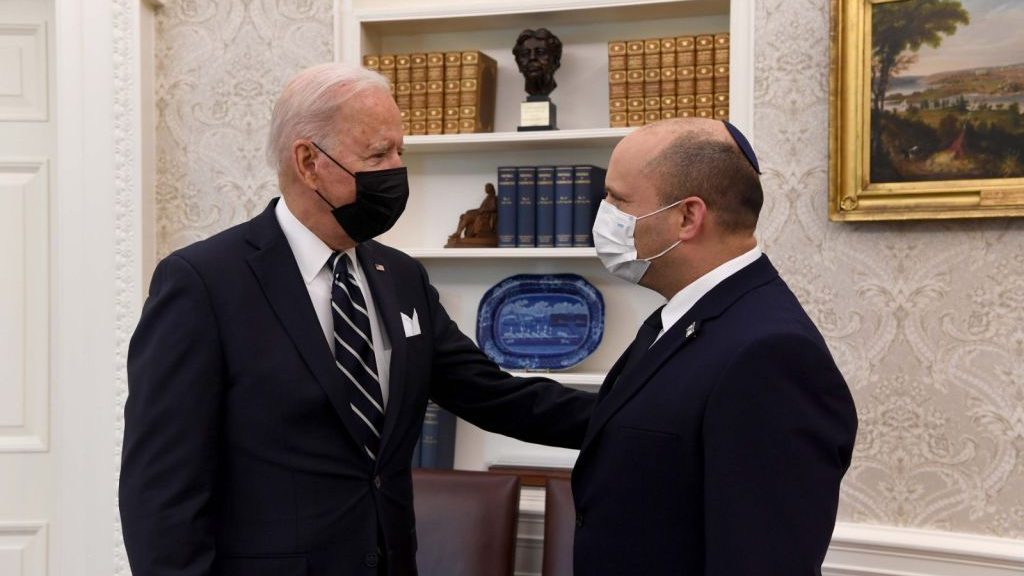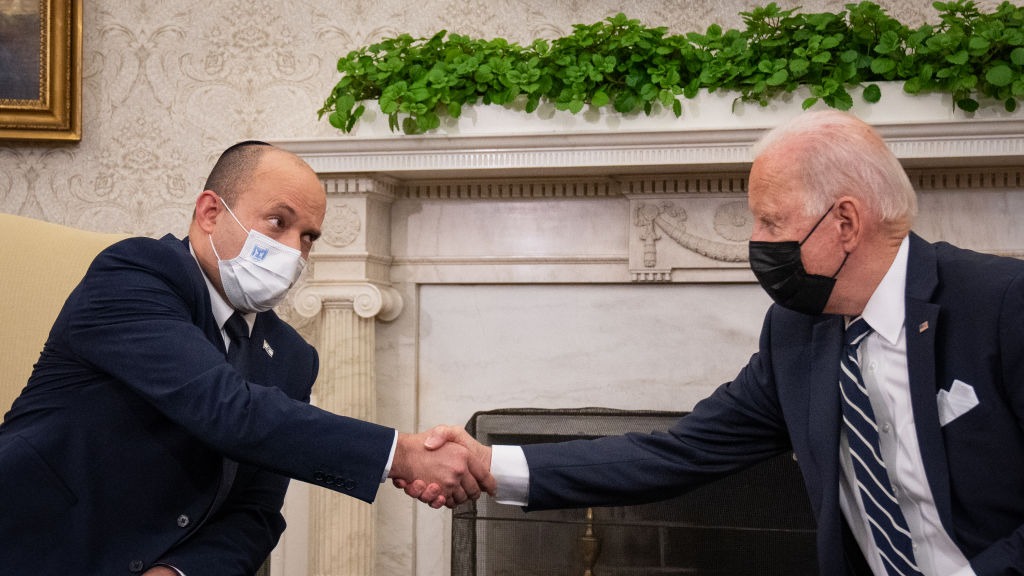
U.S. President Joe Biden (L) meets Prime Minister of Israel Naftali Bennett (R) at the White House, in Washington D.C., August 27, 2021. /Getty
U.S. President Joe Biden (L) meets Prime Minister of Israel Naftali Bennett (R) at the White House, in Washington D.C., August 27, 2021. /Getty
Editor's note: Guy Burton is an adjunct professor at Vesalius College, Brussels. The article reflects the author's opinions, and not necessarily the views of CGTN.
On August 27, U.S. President Joe Biden and Israeli Prime Minister Naftali Bennet met for the first time at the White House. Although there are differences between the two on Iran and Palestine, the two leaders were keen to stress the closeness of their two countries and their common commitment towards each other. As part of this effort, Biden was very clear in declaring his support for Israel to maintain its advantage over other regional militaries, stating that the U.S. would replenish Israel's Iron Dome air-defense system.
That news was welcome for Bennett. He is the first Israeli prime minister since 2009 to visit Washington who is not Benjamin Netanyahu. During the time that Netanyahu was in office, he behaved in an increasingly partisan manner: he openly favored Republican presidents like Donald Trump over Democrats like Barack Obama. Bennett was therefore keen to use the meeting to show that those days are over and that unlike Netanyahu, he can be a constructive partner to Biden.
Of the two, the meeting was probably more important for Bennett than it was for Biden. Because Bennett comes from the same political space as Netanyahu and has served the former prime minister as his chief of staff and as a former minister in his government, he needed to show that he is his own man.
As part of that effort, Bennett came to Washington with some ideas about how to prevent Iran developing a nuclear bomb. That includes increased military spending in the upcoming budget as well as plans to boost its partnership with Arab Gulf allies and keeping open the possibility of covert action against Iran's nuclear facilities.
Biden seems to have entertained these options. Although Biden's stated preference is to return the U.S. to the Joint Comprehensive Plan of Action (JCPOA) – the international agreement in which Iran freezes its nuclear program in exchange for sanctions being lifted against it – the indirect talks that have taken place between Washington and Tehran have failed to reach a resolution so far. With that in mind, Biden may find himself drawn to the Israeli position at some point.
The two leaders were also at odds over Palestine. While Bennett has long been opposed to the creation of a Palestinian state – and is also unwilling to halt the growth of Israeli settlements in occupied territory – Biden supports two states. However, at the meeting the issue of the Palestinians barely came up: while Bennett made no mention, Biden referred to it in passing, reiterating his wish to find peace, security and prosperity for both sides.
Biden's brief nod to the conflict may also reflect wariness at the practical challenges of pursuing a comprehensive settlement. The fact is that neither Israelis nor Palestinians are able to move at present.

Israeli Prime Minister Naftali Bennett meets U.S. President Joe Biden in the Oval Office at the White House, August 27, 2021. /Getty
Israeli Prime Minister Naftali Bennett meets U.S. President Joe Biden in the Oval Office at the White House, August 27, 2021. /Getty
On the Israeli side, there are strong tensions both inside and outside the government. Bennett's government is a coalition of political parties, ranging from the religious and nationalist right to the center and to Arab conservatives. His foreign minister, Yair Lapid, is not only the leader of the largest party in the coalition, but also a supporter of two states as well, although he sees it as a long term ambition rather than something to work towards right now. Given the delicate nature of the coalition then, it is unlikely it will move on more contested issues.
Outside the government, Netanyahu and the right-wing Likud party remain a constant threat. They were vitriolic in their response to Bennett's decision to eject the former prime minister from power. They have employed incendiary language which has unsettled the political right.
Meanwhile on the Palestinian side, Biden will also find it difficult to find a strong partner to work with. In April, President Mahmoud Abbas cancelled elections when it became clear that not only would his Fatah party lose ground to its principal rival, the Islamist Hamas party, but his own position within Fatah was also at risk from challengers.
Then in May, Abbas was largely irrelevant during the fighting between Hamas and Israel in Gaza and was not a presence during the confrontations that spilled over between Jewish Israelis and Palestinian citizens of Israel in Israel's "mixed cities": Jerusalem, Haifa and Lod, for example.
Since then, Abbas has diminished himself further within Palestinian society, by allowing Fatah to clamp down on dissent in the West Bank.
(If you want to contribute and have specific expertise, please contact us at opinions@cgtn.com.)

